Hiring a Validation Engineer can be a complex task for recruiters and hiring managers. Many companies struggle to find candidates with the right mix of technical expertise and soft skills needed for this critical role. The challenge often lies in identifying individuals who can not only validate systems and processes but also communicate effectively with various stakeholders.
This comprehensive guide will walk you through the process of hiring a top-notch Validation Engineer. We'll cover everything from understanding the role to structuring interviews and assessing candidates. For a deeper dive into specific skills to look for, check out our detailed breakdown of Validation Engineer skills.
Table of contents
Validation Engineer Hiring Process
Hiring a skilled Validation Engineer can be a time-consuming process, but it's crucial to find the right candidate for the job. Here's a general overview of the hiring timeline:
- Post the job description on relevant job boards and start collecting resumes.
- Shortlist candidates based on their qualifications and experience.
- Conduct skill assessments to evaluate the candidates' technical abilities.
- Interview the top candidates to assess their problem-solving skills and cultural fit.
- Make an offer to the best candidate.
The entire process can take anywhere from 4 to 8 weeks, depending on the number of applicants and the complexity of the role.
Skills and qualifications to look for in a Validation Engineer
Creating an ideal candidate profile for a Validation Engineer requires a clear understanding of both technical and soft skills. It's important to distinguish between must-have qualifications and nice-to-have attributes, as these may vary based on your company's specific needs and industry focus.
When building your candidate profile, consider the core technical screening requirements alongside any specialized knowledge relevant to your projects. This approach helps ensure you're targeting candidates who can hit the ground running while also having the potential to grow within your organization.
Here are some key skills and qualifications to consider for a Validation Engineer role:
| Required skills and qualifications | Preferred skills and qualifications |
|---|---|
| Bachelor's degree in Computer Science, Engineering, or related field | Certification in software testing (e.g., ISTQB) |
| 3+ years of experience in software testing or quality assurance | Experience with continuous integration and continuous deployment (CI/CD) pipelines |
| Strong knowledge of software testing methodologies and best practices | Knowledge of agile development methodologies |
| Proficiency in test automation tools and frameworks | Familiarity with performance testing and security testing |
| Experience with version control systems (e.g., Git) | Experience in a regulated industry (e.g., healthcare, finance) |
Top 10 Platforms to Hire Validation Engineers
Now that you have a well-defined job description for a Validation Engineer, it’s time to list it on job boards to attract potential candidates. Utilizing various platforms can help you reach a wider audience and find the right fit for your team.
Indeed
One of the largest job boards, ideal for reaching a broad audience when hiring full-time Validation Engineers.

LinkedIn Talent Solutions
Best for leveraging professional networks to hire experienced Validation Engineers with specific skills.

Glassdoor
Useful for showcasing company culture and attracting candidates by promoting your company’s brand alongside job listings.
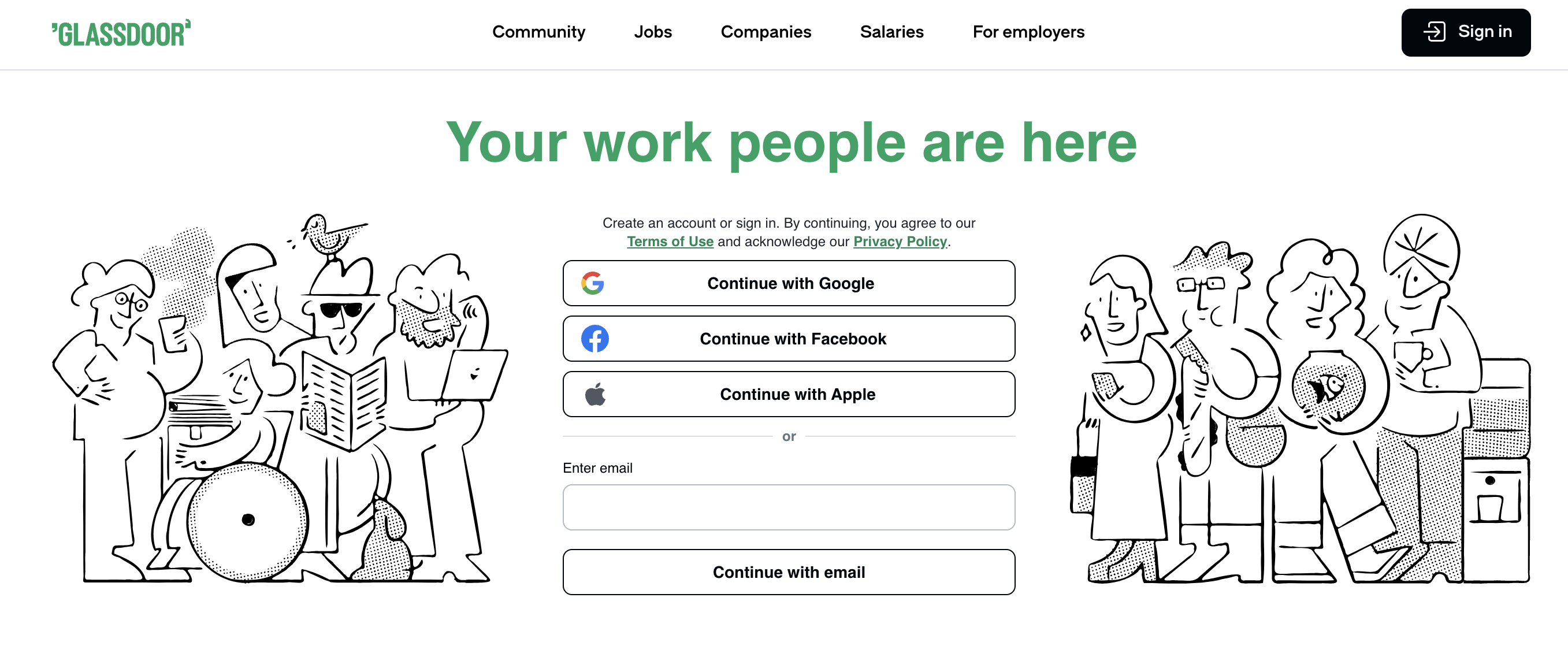
Consider starting with platforms like Indeed, which is one of the largest job boards for full-time positions, and LinkedIn Talent Solutions, ideal for leveraging professional networks. Other notable sites include Glassdoor, which helps showcase your company culture, and Upwork, perfect for finding freelance Validation Engineers for short-term roles. Each of these platforms caters to different hiring needs and can significantly enhance your recruitment efforts.
Keywords to Look for in Validation Engineer Resumes
Resume screening is a key step in finding the right Validation Engineer. It helps you quickly identify candidates with the most relevant skills and experience before moving to interviews.
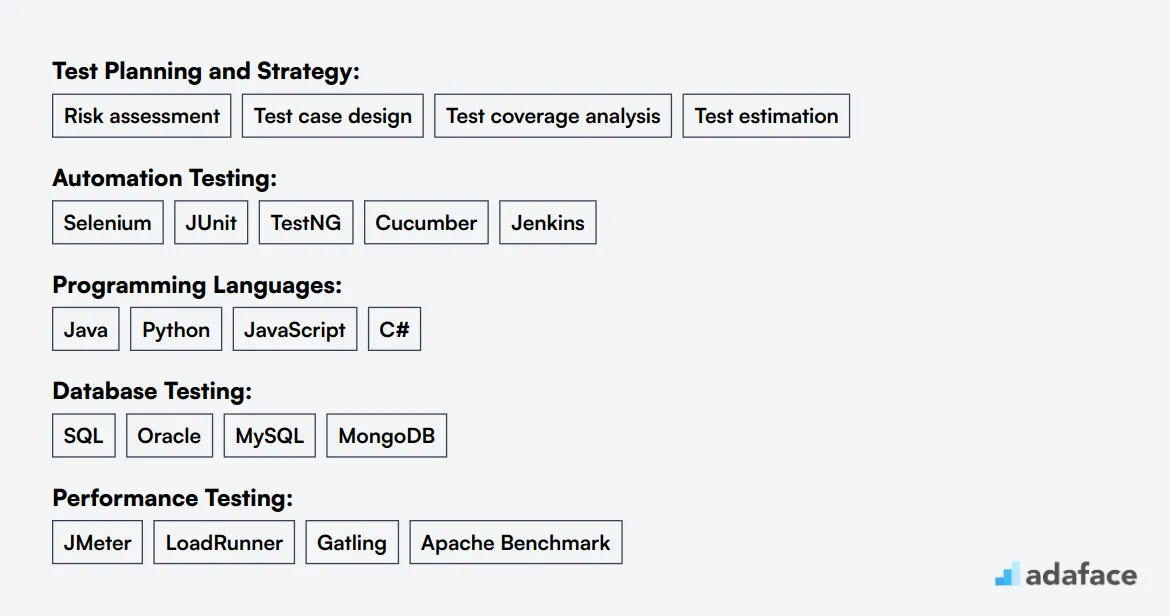
When manually screening resumes, focus on key technical skills like quality assurance, test automation, and programming languages. Look for experience with specific tools like Selenium, JUnit, and Jenkins. Don't forget soft skills such as analytical thinking and attention to detail.
To speed up the process, you can use AI tools like ChatGPT to screen resumes. Simply provide the AI with the job requirements and keywords, then let it analyze candidate resumes and provide recommendations. This can save significant time in the initial screening phase.
Here's a sample prompt for AI resume screening:
TASK: Screen resumes for Validation Engineer role
INPUT: Candidate resumes
OUTPUT: For each resume, provide:
- Name
- Matching keywords
- Score (out of 10)
- Shortlist recommendation (Yes/No/Maybe)
KEYWORDS:
- Quality Assurance
- Test Automation (Selenium, JUnit, TestNG)
- Programming (Java, Python, JavaScript)
- CI/CD
- Performance Testing
- Analytical Thinking
Recommended skills tests for assessing Validation Engineers
Skills tests are an effective way to evaluate Validation Engineers beyond their resumes. They provide objective insights into a candidate's technical abilities and problem-solving skills. Here are five key tests we recommend for assessing Validation Engineers:
QA Engineer Test: This QA Engineer test evaluates a candidate's knowledge of quality assurance principles, testing methodologies, and bug tracking. It's useful for assessing a Validation Engineer's ability to ensure product quality and compliance.
Attention to Detail Test: Validation Engineers need to spot even minor discrepancies. An attention to detail test helps assess a candidate's ability to notice small errors and maintain accuracy in their work.
Problem Solving Test: A problem solving test evaluates a candidate's analytical skills and ability to find solutions to complex issues. This is valuable for assessing how a Validation Engineer might approach challenging validation scenarios.
SQL Online Test: Many validation processes involve working with databases. An SQL online test can help gauge a candidate's ability to query and manipulate data, which is often necessary in validation work.
Manual Testing Online Test: While automation is important, manual testing skills are still valuable for Validation Engineers. A manual testing online test can assess a candidate's ability to design test cases and execute them effectively.
How to structure interview stage for hiring Validation Engineers
After candidates pass the skills tests, they should progress to technical interviews where their hard skills are further evaluated. While skills tests are effective at filtering out unsuited candidates, they don't always identify the best-fit candidates for the role. During interviews, it's important to ask targeted questions that reveal a deeper understanding of the candidate's expertise and problem-solving abilities.
Sample interview questions for validation engineers might include: What validation processes have you implemented in previous projects? This question assesses their practical experience. How do you ensure compliance with industry standards? highlights their knowledge of regulations. Can you describe a time when you identified a critical issue in a validation process and how you resolved it? This question evaluates their problem-solving skills. How do you prioritize tasks when given multiple validation projects? tests their organizational skills. Finally, asking about specific tools, like What testing tools are you familiar with and prefer?, can provide insight into their technical proficiency. For more on the skills required for this role, explore skills required for validation engineer.
How much does it cost to hire a Validation Engineer?
The cost to hire a Validation Engineer can vary significantly based on location and experience. In the United States, salaries range from $59,907 to $137,650 with a median of $90,808. In India, the range is from ₹394,106 to ₹1,949,231, with a median salary of ₹876,472. Factors such as the specific city and industry can also influence these figures.
Validation Engineer Salary in the United States
The average salary for Validation Engineers in the United States ranges from $59,907 to $137,650, with a median of $90,808. This variation largely depends on factors such as location, experience, and industry.
Top-paying cities for Validation Engineers include Sunnyvale, CA, with a median salary of $121,735, and Warren, MI, at $101,027. On the lower end, cities like Austin, TX, and Southfield, MI, offer median salaries around $75,000 to $70,000 respectively.
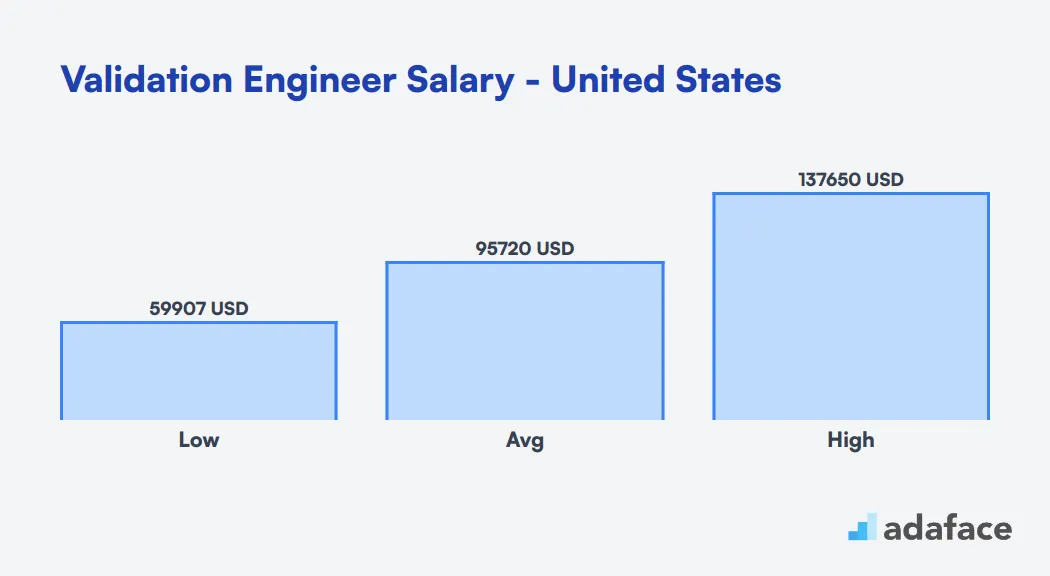
Validation Engineer Salary in the United Kingdom
The average salary for a Validation Engineer in the United Kingdom is approximately £45,000 per year. Entry-level positions can start around £30,000, while experienced professionals may earn up to £70,000 or more, depending on the industry and location.
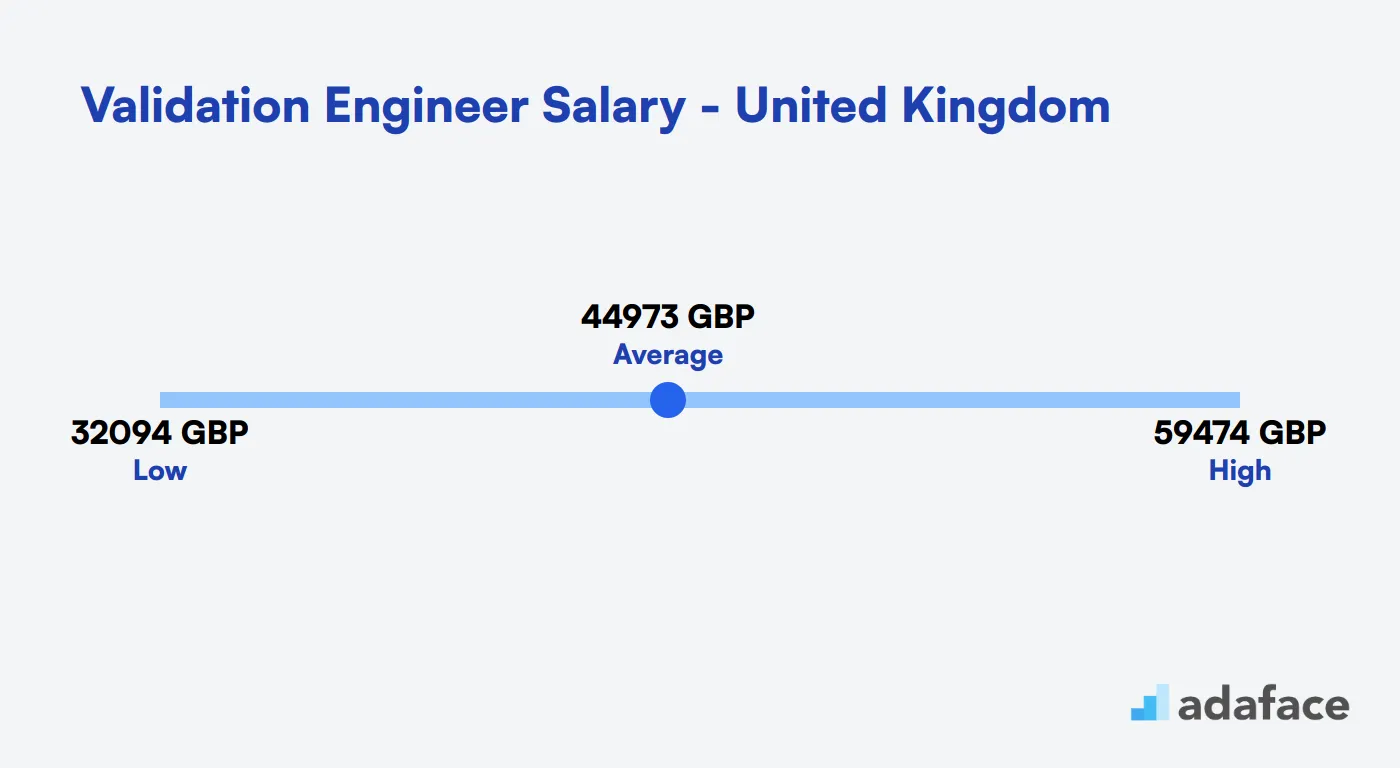
Validation Engineer Salary in India
In India, Validation Engineers can expect competitive salaries that vary based on location and experience. The average salary ranges from ₹394,106 to ₹1,949,231 per year, with a median of ₹876,472.
Top-paying cities for Validation Engineers in India include Bengaluru, Hyderabad, and Pune. Bengaluru offers the highest salaries, with a median of ₹951,169, while Hyderabad and Pune follow with median salaries of ₹651,406 and ₹553,249 respectively.
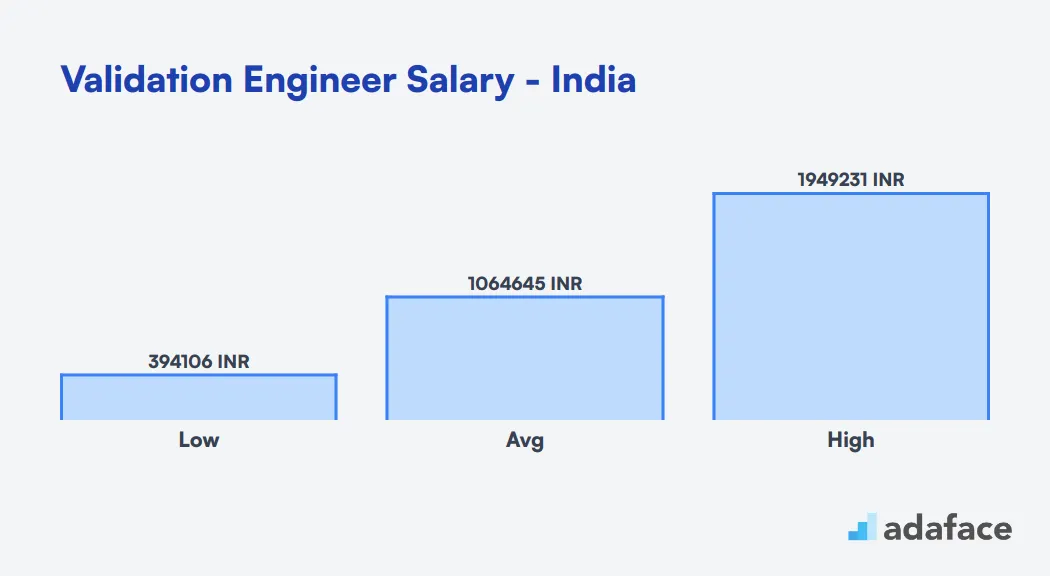
What's the difference between a Validation Engineer and a Test Engineer?
People often confuse Validation Engineers with Test Engineers, as both roles involve ensuring the quality of products or systems. However, their focus and approach in the development cycle differ significantly.
Validation Engineers concentrate on product/system validation at the later stages of development, focusing on end-to-end system validation. They ensure that the final product meets all regulatory standards and industry specifications by working with cross-functional teams and stakeholders. Their tools of trade include simulation software and data analysis tools, producing deliverables like validation reports and compliance documentation.
In contrast, Test Engineers are involved throughout the development process, concentrating on functional testing of specific components or features. Their primary skills include test case design and defect tracking, often working closely with developers and QA teams. They utilize test automation frameworks and bug tracking systems to create test plans, test cases, and bug reports. For more on test engineer skills, check out test engineer skills.
| Validation Engineer | Test Engineer | |
|---|---|---|
| Focus | Product/system validation | Functional testing |
| Scope | End-to-end system validation | Specific component or feature testing |
| Timing in Development Cycle | Later stages, pre-release | Throughout development process |
| Skills | System integration, requirements analysis | Test case design, defect tracking |
| Tools | Simulation software, data analysis tools | Test automation frameworks, bug tracking systems |
| Interaction | Cross-functional teams, stakeholders | Developers, QA team |
| Deliverables | Validation reports, compliance documentation | Test plans, test cases, bug reports |
| Industry Knowledge | Regulatory standards, industry specifications | Software development methodologies |
What are the ranks of Validation Engineers?
Validation engineering can often be mistaken for similar roles like quality assurance or test engineering. However, each of these roles has distinct responsibilities and career progressions. Here’s a breakdown of the typical ranks you might find in the validation engineering hierarchy:
- Junior Validation Engineer: Typically an entry-level position where individuals assist senior engineers in testing products and processes. They are usually responsible for data collection, basic testing procedures, and reporting any discrepancies.
- Validation Engineer: At this level, engineers design and execute validation plans to ensure product quality. They work on developing protocols and are involved in both the analysis and interpretation of test data.
- Senior Validation Engineer: These engineers have advanced expertise and often lead validation projects. They oversee the work of junior engineers, troubleshoot complex validation issues, and ensure compliance with industry standards.
- Validation Engineering Manager: This role involves managing a team of validation engineers. Managers are responsible for strategic planning, resource allocation, and ensuring that all validation activities align with organizational goals. They also collaborate with other departments to optimize validation processes.
For a more detailed understanding of what a validation engineer does, consider reviewing a comprehensive validation engineer job description to help distinguish this role from others in technology fields.
Hire the Best Validation Engineers for Your Team
In this post, we've covered the key aspects of hiring Validation Engineers, from understanding their role to structuring interviews. We've explored the skills to look for, platforms to find candidates, and how to assess their abilities effectively.
The main takeaway is to use well-crafted job descriptions and skills tests to make your hiring process more accurate. By focusing on these elements, you'll be better equipped to identify and bring on board top-notch Validation Engineers who can contribute significantly to your team's success.
QA Engineer Test
FAQs
Look for candidates with a bachelor's degree in engineering, computer science, or a related field. Key qualifications include experience with validation methodologies, knowledge of regulatory standards, and familiarity with quality management systems.
Use a combination of technical interviews, practical tests, and online skill assessments to evaluate a candidate's technical proficiency in areas such as validation protocols, risk analysis, and documentation.
Key soft skills include strong analytical thinking, attention to detail, excellent communication abilities, problem-solving skills, and the ability to work well in cross-functional teams.
Look for candidates on professional networking sites, job boards specializing in engineering roles, and through referrals from current employees. Consider partnering with engineering schools or attending industry-specific job fairs.
The hiring process for a Validation Engineer can take anywhere from 4 to 8 weeks, depending on factors such as the urgency of the role, the number of qualified candidates, and the complexity of your organization's hiring procedures.
Ask about their experience with specific validation methodologies, their approach to risk assessment, how they stay updated on regulatory requirements, and examples of complex validation projects they've worked on. For more ideas, check out our list of Validation Engineer interview questions.
In addition to technical skills, assess cultural fit by involving team members in the interview process, discussing work style preferences, and considering personality assessments that align with your company values.

40 min skill tests.
No trick questions.
Accurate shortlisting.
We make it easy for you to find the best candidates in your pipeline with a 40 min skills test.
Try for freeRelated posts
Free resources



